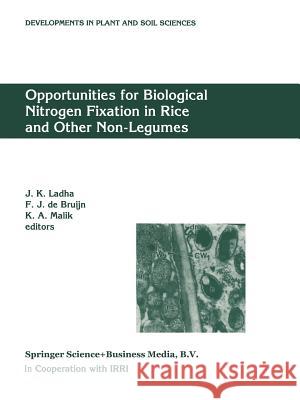Opportunities for Biological Nitrogen Fixation in Rice and Other Non-Legumes: Papers Presented at the Second Working Group Meeting of the Frontier Pro » książka
Opportunities for Biological Nitrogen Fixation in Rice and Other Non-Legumes: Papers Presented at the Second Working Group Meeting of the Frontier Pro
ISBN-13: 9780792347484 / Angielski / Miękka / 1997 / 216 str.
Opportunities for Biological Nitrogen Fixation in Rice and Other Non-Legumes: Papers Presented at the Second Working Group Meeting of the Frontier Pro
ISBN-13: 9780792347484 / Angielski / Miękka / 1997 / 216 str.
(netto: 192,11 VAT: 5%)
Najniższa cena z 30 dni: 192,74
ok. 22 dni roboczych.
Darmowa dostawa!
During the next 30 years, farmers must produce 70% more rice than the 550 millions tons produced today to feed the increasing population. Nitrogen (N) is the nutrient that most frequently limits rice production. At current levels ofN use efficiency, we will require at least double the 10 million tons of N fertilizer that are currently used each year for rice production. Global agriculture now relies heavily on N fertilizers derived from petroleUIll, which, in turn, is vulnerable to political and economic fluctuations in the oil markets. N fertilizers, therefore, are expensive inputs, costing agriculture more than US$45 billion annually. Rice suffers from a mismatch of its N demand and N supplied as fertilizer, resulting in a 50-70% loss of applied N fertilizer. Two basic approaches may be used to solve this problem One is to regulate the timing ofN application based on needs of the plants, thus partly increasing the efficiency of the plants' use of applied N. The other is to increase the ability of the rice system to fix its own N. The latter approach is a long-term strategy, but it would have enormous environmental benefits while helping resource-poor farmers. Furthermore, farmers more easily adopt a genotype or variety with useful traits than they do crop and soil management practices that may be associated with additional costs.











